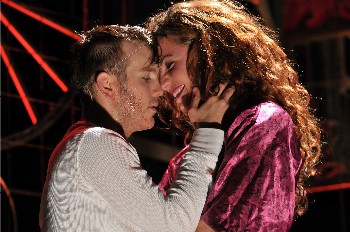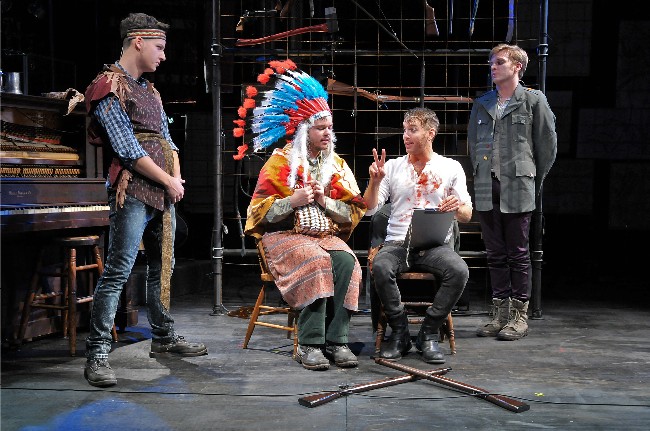Theater Review: A Top-Notch Staging of “Bloody Bloody Andrew Jackson”
Despite the material’s limitations, the stellar SpeakEasy Stage cast and designers nail Bloody Bloody Andrew Jackson’s irreverent, over-the-top vibe, serving up plenty of humor and high amplitude entertainment.
Bloody Bloody Andrew Jackson. Book by Alex Timbers. Music and Lyrics by Michael Friedman. Directed by Paul Melone. Musical Direction by Nicholas James Connell. Choreography by Larry Sousa. Fight Choreography by Angie Jepson. Scenic Design by Eric Levenson. Costume Design by Elisabetta Polito. Lighting Design by Jeff Adelberg. Sound Design by Eric Norris. Props by Natalie Kearns. Presented by SpeakEasy Stage Company. At the Boston Center for the Arts, 527 Tremont Street, Boston, MA, through November 17.
“Why don’t you just shoot me in the head/Cause you know I’d be better off dead/if there’s really no place in America/for a celebrity of the first rank” — “Rock Star” from Bloody Bloody Andrew Jackson
By Alyssa Hall

Andrew & Rachel — Gus Curry and Alessandra Vaganek as President and Mrs. Jackson in a scene from the SpeakEasy Stage Company production of BLOODY BLOODY ANDREW JACKSON. Photo: Craig Bailey/Perspective Photo
Like its title character, the emo-rock musical Bloody Bloody Andrew Jackson bounds about like a petulant teen: it exudes lots of raw energy in an effort to shock people in the name of hammering home a rebellious point. Thus the show’s adolescent political observations, though often interesting and funny, quickly become one note when repeated ad nauseam. Luckily, SpeakEasy Stage really rocks that one note: despite the material’s limitations, the stellar cast and designers nail Bloody Bloody Andrew Jackson‘s irreverent, over-the-top vibe, serving up plenty of humor and high amplitude entertainment.
The production’s set and costumes capture the show’s anachronistic, youthful, and irreverent vibe. Tall, metal gridded panels, hung with themed item collections (weapons, maps, wheels, a wall of mirrors), evoke the period without being slavishly realistic. Similarly, the costumes are a mix of period (frilly collared capes and sometimes wigs for snooty, elite Congressmen), contemporary (tight jeans, a Jackson t-shirt, and a military jacket for Jackson the self-involved and violent rock star), and a mash-up of both styles (the ensemble’s purple, punk rock-ish corsets). The piece-meal garb evokes the era while at the same time reinventing it in an amusing way for modern audiences.
Bloody is loosely based on President Jackson’s life, but, as in the high stakes game of politics, facts pop up only when they fit the show’s monomaniacal message—half-truths and fictions abound. Despite the title, it’s not really Jackson’s story, but an entertainment about Americans’ relationship with the office of the President: a tongue-in-cheek look at how image and conviction trump fact and personality, how the public conflictingly wants to elect a common man but worship a celebrity, and how fickle love and fame are once they have been won.
The production aptly satirizes the celebrity machinery in a rally scene. Jackson climbs down from metal stage scaffolding (illuminated by bold, concert lighting), struts to a floor mike, and declares his celebrity merits in the loud anthem “Rock Star” (see quotation above). The backdrop for this show-biz posturing: Obama-knock off posters, campaign slogans (“populism, yeah, yeah!”), patriotic banners, and thrilled fans who are later decked out in Jackson merch—only a slight exaggeration of the hyper-sell presentation of today’s rallies.
The energetic score matches Jackson’s childish, in-your-face, self-involved personality with emo rock, adding touches of bluegrass that reflects the figure’s Southern, from-the-people background. Some cabaret bits emphasizes that it’s all a show. The terrific band impresses, especially Nicholas James Connell, who deftly multi-tasks as pianist/conductor while jumping into the action to sing and act as the Bandleader character.
Without a compelling Jackson, who can maintain the high physical and mental intensity necessary to sing emo rock, deliver high-intensity dialogue, fight, dance, and handle physical comedy for almost two hours straight, the show would fail miserably. Thankfully, Gus Curry excels at this difficult job.
Bloody’s Jackson, as the characters note often, is a total “asshole”: abrasive, impulsive, violent, and crass, he starts a bar fight with Spaniards because they call him gay, bullies Indians out of their lands, and impulsively grabs a baby from a battlefield to give to his wife as a souvenir.
Curry plays up Jackson’s dim childishness for the sake of comedy instead of focusing on his raw sexuality (as Benjamin Walker did on Broadway). This mitigates audience distaste for his obnoxious behavior, rendering his nasty antics more fun and excusable. He pouts and slams chairs when things don’t go his way like a kid having a tantrum who doesn’t fully understand what he is doing, but knows absolutely what he wants and when he wants it. Curry’s commanding conviction and his strong voice and acting generate the kind of charisma necessary to explain why people follow the character despite his faults.
The show fully utilizes the superb ensemble: members play multiple characters, are rarely offstage, and make good use of spotlighted solo or comedy turns that showcase their ample talents. One standout is Amy Jo Jackson. In her sultry rendition of “10 Little Indians,” sung as Jackson bullies various tribes out of their lands, she adds notes of harshness that underscore the bitter consequences for Native Americans that result from these (apparently) matter-of-fact business dealings.
Given the high level of talent available in the SpeakEasy Stage production, it’s a shame that the show’s plot and character development are undernourished—the creators were much too busy trying to be edgy in ways that drive home their simple and cynical political points. The exploitative pile up of crass jokes and obscenities—expressions of Jackson’s raw personality—get old fast. The most egregious example of gross caricature added only for the sake of shock value is Jackson’s bloodletting sexual fetish, which culminates with him and his wife smearing blood on each other while singing inanities like “If you feel like you might throw up/Well that’s a metaphor for how I feel/When I dream of you./Bathed in your metaphorical blood.” Surely there are other ways to show them “falling in love” that actually connect with the plot or add complexity to their personalities.
Sometimes the focus on delivering political messages subsumes plot development. (Are the multiple scenes, where Jackson surprises tour groups to get their views on Cherokee relocation, necessary to demonstrate that the often uneducated public doesn’t speak with a unified voice or want responsibility for the hard decisions?)

Business With the Indians — From left: Evan Murphy, Joshua Pemberton, Gus Curry, and Tom Hamlett in a scene from the SpeakEasy Stage Company production of BLOODY BLOODY ANDREW JACKSON. Photo: Craig Bailey/Perspective Photo
The show’s real weakness, however, is Jackson’s lack of character development, which the musical itself acknowledges, perhaps as a defensive maneuver. “Some people never change,” remarks a spectator during Jackson’s final speech. Martin Van Buren protests, “I thought [Jackson] changed a lot. He had a whole arc.” Van Buren must not have watched the show very carefully. Jackson starts and ends as someone eager to fight, desperate for attention, and unwilling to compromise. From gun pointing in the Western territories, insulting Spaniards and elites, and Indian bullying at the beginning, he moves onto to gun pointing in the White House, insulting and ignoring Congress, and deciding to forcibly relocate the Cherokees. It’s hard to care about a character who never seems to learn or change.
A few vaguely regretful lines about the Trail of Tears and Jackson’s treatment of his wife pop up in the last few scenes, when it’s too late to see if the man’s behavior alters in response. These intimations of ethical concern come directly after Jackson learns that history regards him as controversial and not a hero—a revelation that upsets him. So, even then, it is unclear whether he regrets his choices because they were morally wrong or merely feels sorry that they undercut his legacy as a celebrity.
Still, while Bloody Bloody Andrew Jackson always sings the same cynical song, at least it’s a fun, silly, high-octane tune for anyone into loud emo-rock and irreverent, sometimes low-brow humor. The top-notch singing, acting, and design of the SpeakEasy Stage production make the most of the carnage.
